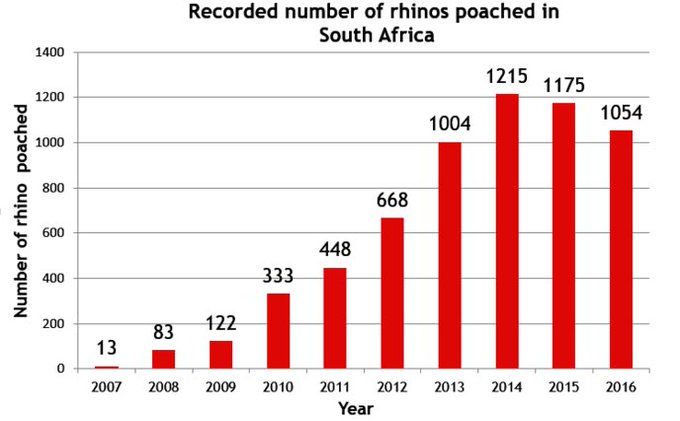Interesting #JohnHume started farming #Rhino in 2007
After that poaching increased, I wonder if he planed it that way … #RhinoHornAuction
Massive South African Rhino Horn Stockpile Goes on Auction
By Tunicia Phillips
South Africa will be home to the world’s first rhino horn auction from 21 – 24 August, 2017. Last minute efforts to stop the auction failed this weekend after the country’s biggest captive rhino breeder won a High Court bid to force the release of his auction permit. South Africa is home to around 80% of the world’s rhino population. Despite rhino poaching statistics showing a decrease in the last two years, conservationists say at least three rhinos are still poached daily.
International Outrage
The Vietnamese government has issued an official statement reminding traders that importing rhino horn is not legal in their country, and anyone caught will face 25 – years imprisonment. One of the world’s biggest rhino farmers in South Africa, John Hume announced a massive online auction soon after South Africa lifted its ban on local horn trade. The Vietnamese government said that in line with the suspicious language options (Vietnamese and Chinese) on the auction site, it wants to reiterate that rhino horn bought through this auction cannot be sold in Vietnam.
Humane Society International – Vietnam (HIS) has now called on South Africa to honour its commitment to protect rhinos by refusing to grant permits for horn auctions ahead of the scheduled horn sale on August, 21. The HSI has described the lifting of local trade bans as a “gift to criminals’’. HSI said despite a legal purchase in South Africa, the horns bought at the auction have a significant risk of being illegally trafficked to big Asian markets. Rhino protection groups have been scrambling in a last minute effort to launch a petition against the bid. The only scientifically proven medical condition that rhino horn treats is fever. Big markets for the world’s rhino horn in Asia also believe that it treats cancer.
“While this auction seems intent on targeting Vietnamese and Chinese nationals, HSI stands with the government of Vietnam in sending a strong message that rhino horn has no medicinal benefits. Consumption and ownership of it contributes only to the extinction of rhinos, and those caught smuggling rhino horn into Vietnam will face up to 15 years in prison.
“We hope that the South African government will play its part by denying permits for this auction to go ahead,” the NSI statement said.
There are two auctions planned for the huge stockpile (6 tons) of horns on John Hume’s farm. A physical auction takes place at his farm on September, 19 after the online auction closes on 24 August.
Hume’s farm is home to a large number of white rhino which is a species listed as ‘Near Threatened’ by the International Union for the Conservation of Nature (IUCN).
His project ‘Threatened or Protected Species’ or TOPS aims to ensure his rhinos are: “safely and regularly trimmed by a veterinarian and capture team to prevent poachers from harming them”.
“The ongoing eradication of rhinos reveals that the demand for rhino horn is large and not going to die down anytime soon.
“Therefore, we believe that it is crucial to encourage the breeding and protection of rhinos; if we don’t, they will be heading for extinction very soon,” said Hume in a statement on his auction website.
The rhinos on Hume’s farm are dehorned and added to his growing stockpile. Unlike elephants that lose their tasks forever, rhinos can grow theirs back.
In response to the Hume’s ‘frequently asked questions and answers’, Wildlife ACT has written an open letter challenging the rationale for horn trade legalisation as a tool for conservation.
“The concern is that people will counterfeit legal certificates and bribe officials to pass through illegal horn using the legal channels you want to open up – meaning we are just opening up yet another channel. This will make it easier to pass illegal horn off as legal product, fancy DNA system or not, and we will end up with increased volumes of rhino horn moving out the country… We live in Africa John, that is unfortunately how things happen and one of the many issues we currently face – bribery and corruption. Oh, and Asia also has some of those issues… Let’s tackle that first. This isn’t Switzerland selling chocolate bunnies to Sweden.”
Regulations for domestic horn trade
South Africa’s current draft regulations allow for a foreign buyer to purchase a maximum of two horns. A buyer will also need to present permits [under the National Environmental Management: Biodiversity Act (Nemba), Act No 10 of 2004, its regulations and applicable provincial legislation] and authorisation. The permit applicant will also need written authorisation from their country’s government assuring the Department of Environmental Affairs (DEA) DEA that the import will not be in contravention of Convention on International Trade in Endangered Species (CITES) CITES . It is unclear whether the DEA’s ambition to microchip all horn stockpiles and to conduct a full audit in the country has been completed ahead of the controversial auction. The DEA’s Moses Rannditsheni said that the department’s conditions are that they must be able to access the auction website to enable them to monitor compliance.
“We also want the bidders to first obtain permits from the department before they are allowed to buy any rhino horn.
“We want the public to understand that this rhino horn trade is local and not international, meaning that the rhino horn that is bought will not leave this country.
Shortly after speaking to Kaya News the twitter handle for the auction stated that a permit would not be needed to bid and buy and could be obtained after.
The DEA later explained that horn will not be handed over to buyers without a permit.
Rhino NGO’s smell trouble
Save the Rhino, a South African based non-governmental organisation, said there is no information on any limitations to be placed upon bidders.
“Although the auction website makes it clear that prospective buyers are required to hold a permit – presumably obtained from the Department of Environmental Affairs (DEA) – to buy a horn, there is currently no mechanism for potential bidders to obtain these permits.
“Neither is there any information on whether and how the vendor and auctioneer intend to ‘vet’ potential bidders, though media coverage has speculated the buyers will have to be South African nationals or those with residency status in South Africa,” the organisation said in a statement.
“We are surprised that Van’s auctioneers would choose to take part in auctions that have the clear potential to facilitate laundering rhino horn in the guise of permitted sales,” they said.
International criminologists and researchers weigh in on illicit horn trafficking in South Africa
International criminologists and researchers believe that the lifting of local rhino horn trade in South Africa may contribute to illicit horn trafficking and poaching.
“Legalising rhino horn trade domestically in South Africa could open opportunities for laundering of rhino horn that can be traded legally in the country and then moved into other counties,” said Hubert Chueng at a press briefing on international wildlife trafficking in Cartagena, Colombia.
The same presser on the sidelines of the International Congress for Conservation Biology would later take a turn when two researchers began an impromptu debate over the rhino poaching crisis. The question posed by a South African journalist was whether the panel thought that the lifting of local rhino horn trade would possibly worsen the poaching problem.
Research for this story was aided by generous support from the Earth Journalism Network’s Fellowship programme.
Written by: Kayafm Digital
Similar posts
MORE ARTICLES
QUICK LINKS
UpComing Shows

959 Music Weekdays
Kaya 959 Hits
Real. Familiar. Memorable. Kaya 959 brings you the music you know and love from our playlist. Uninterrupted. Thursdays 20h00 to 21h00
close
The Best T in the City
With T Bose
He has held it down in the world of mid-morning radio with the best music, riveting topics, brilliant mixes and interesting guests. Every weekday, The Best T proves why he is the BEST by connecting to you like only your bro or favourite uncle could. He lets his listeners dictate the songs they want to hear in the ever-popular Top 10 at 10, and his Three Teaspoons never run out. Catch The Best T in the City Mondays to Fridays from 09h00 to 12h00.
close
Feel Good
With Andy Maqondwana
Feel good about feeling good! That's exactly what The Feel-Good show is about. An escape from the negativity that surrounds us, indulging you in good feels. Pass it on to one and all. Spread the good feeling around Gauteng with Andy Maqondwana.
close
Kaya Biz
With Gugulethu Mfuphi
The world of business is simplified for you by Kaya Biz with Gugulethu Mfuphi. This fast-paced award-winning business show talks to the corporate giants as well as up and coming entrepreneurs about their wins and challenges. Gugulethu invites guests to offer their analyses of markets and economies, and also delves into issues of personal financial wellness. Kaya Biz airs Mondays to Thursdays 18h00 to 19h00.
close
Point of View
With Phemelo Motene
Point of View with Phemelo Motene delves into the day’s current affairs, touches on real issues that affect people’s daily lives and shares expert advice on questions posed by the audience. Mondays to Thursdays 20:00 to 22:00.
closeConnect with Kaya 959
DownLoad Our Mobile App
© 2024 Kaya 959 | On The Street On The Air

















